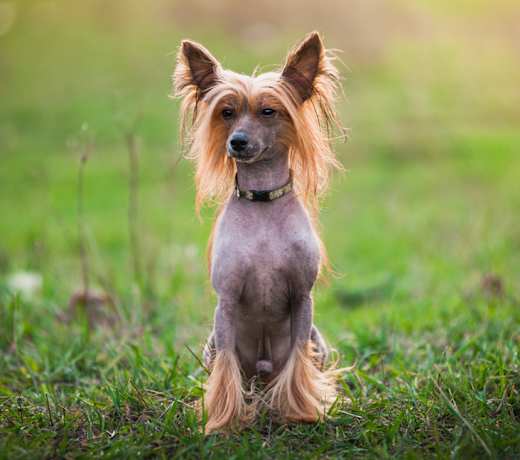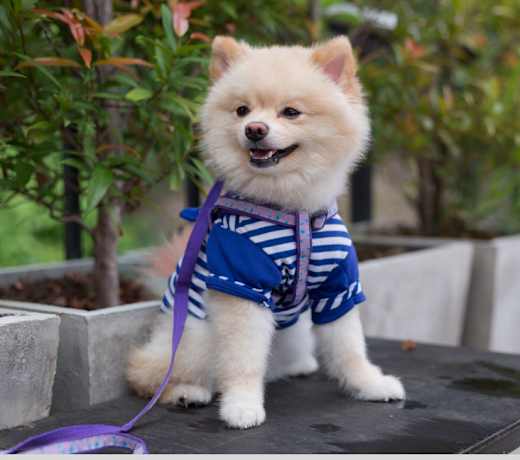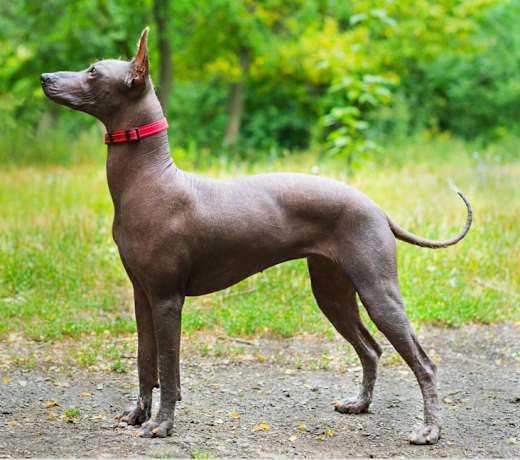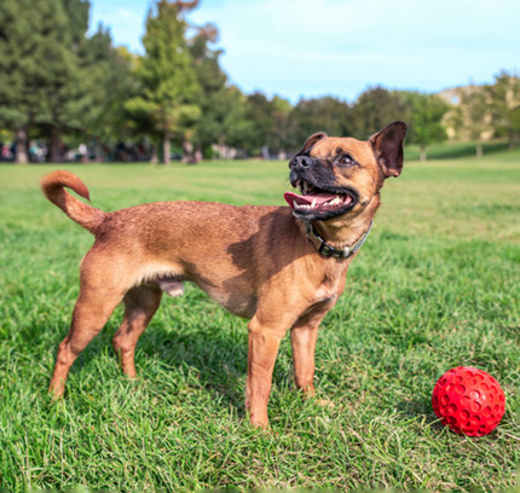Yes, many Chihuahuas have curly tails, though not all of them do. The breed standard typically calls for a tail that’s carried high with a gentle curl, often with the tip of the tail curled over their back. Although some Chihuahuas have straight tails, a curled tail is more common, especially in the breed’s natural expression of their playful and alert demeanor. The curl can vary in tightness, from a loose curl to a more tightly coiled one. It’s one of the breed's distinctive features, adding to their cute, spirited appearance.
Chihuahua
Breed Type: Toy
Common nicknames: Chi
Coat: Smooth
Hypoallergenic: No, they will likely trigger allergies.
Temperament: Confident, lap-dog, clever, territorial
Life expectancy: 14-20 years
Color & patterns:
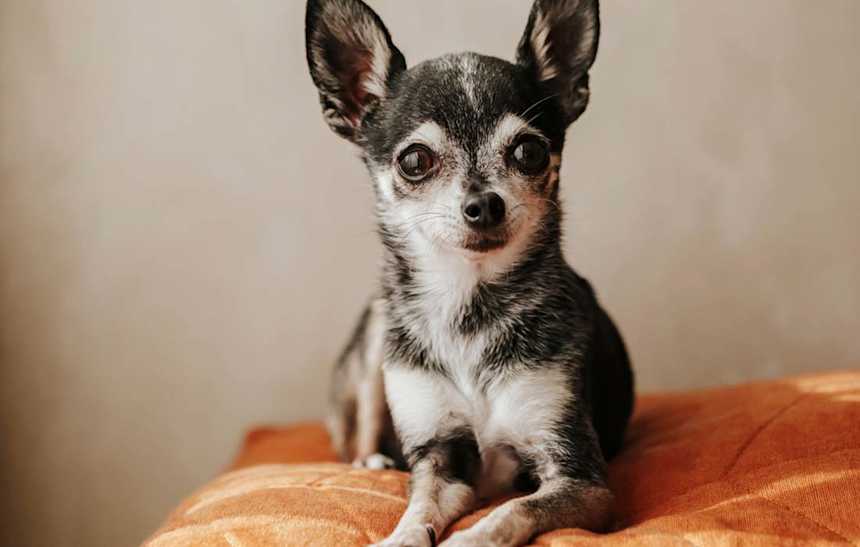
Originally from Mexico, the small but mighty Chihuahua is like a little package of dynamite. Despite their size (we’re talking teacup level here), these pups are feisty, but they will apply that energy to protect their families; these fiercely loyal pups make the pocket-sized guard dog. Aside from their sassy personalities, Chihuahuas are known for their unique appearance: their apple-shaped heads and bug eyes make them instantly recognizable. So, whether you’re looking for a lap-dog or a fierce protector, the Chihuahua has got you covered.
Chihuahua characteristics
Learn about about Chihuahua basics like their fur colors, shedding levels, how much grooming they need, and other Chihuahua facts.
Average height
6-9 inches (15.2-22.9cm)
Average weight
2-9 pounds (0.9-4.1 kg)
Average lifespan
14-20 years
Exercise needs
Grooming needs
Full-grown size
Good with cats
Good with kids
Training Aptitude
When do Chihuahuas’ ears stand up?
Chihuahuas’ ears begin to stand up between three and six months of age, but this can vary from dog to dog. It's common for their ears to be floppy when they’re young, especially in their early weeks of life. The cartilage in their ears needs time to develop and strengthen, which is what allows them to stand up. If a Chihuahua’s ears don’t stand up by the time they’re about six months old, they may stay floppy, though many dogs with floppy ears are still perfectly healthy and have no issues. Genetics also play a role: Some Chihuahuas naturally have more upright ears, while others may have ears that stay down.
Do Chihuahuas come in merle pattern?
Yes, Chihuahuas can come in a merle pattern, but this is not recognized as part of the breed standard by major kennel clubs, such as the AKC. The merle pattern is characterized by a swirling mix of lighter and darker colors across the coat, often creating a marbled or dappled look.
Although merle Chihuahuas exist, the pattern is typically found in Chihuahuas crossbred with merle-patterned dogs. Some breeders may intentionally breed for a merle coat, but it’s worth noting that merle Chihuahuas can be prone to health issues, such as vision or hearing problems, particularly if both parents carry the merle gene.
Are there different Chihuahua skull shapes?
Yes, there are two different Chihuahua skull shapes, apple head and deer head. Apple-head Chihuahuas are the common, recognizable head shape for Chihuahuas. This skull is rounded, with a prominent dome at the top of the head, so the face has a more apple-like appearance. This shape gives the Chihuahua their distinctive look and is the breed standard for many shows.
Some Chihuahuas have a deer-head shape, which is a bit longer and more tapered than the apple head. The forehead is flatter, and the overall head is less rounded. Deer-head Chihuahuas tend to have more refined, elongated faces, and this head type is sometimes seen in Chihuahuas with mixed ancestry. The deer head is more commonly seen in pet Chihuahuas.
Neither skull shape impacts the health or temperament of the dog. However, the apple head can sometimes be associated with a condition called “open fontanel,” where the soft spot on the skull doesn’t fully close as it should, but this can be managed with proper care.
How fast can a Chihuahua dog run?
A Chihuahua can run up to around 10 to 15 miles per hour in short bursts. Although they’re small and don’t have the long legs of larger breeds, they’re quick and agile for their size. Their bursts of speed usually come out when they’re playing, excited, or chasing something interesting — even if it’s just a leaf blowing across the yard.
That said, they’re not built for long-distance running or endurance. Short, supervised play sessions or brisk walks are a better fit for their energy and build.
Do long-haired Chihuahuas shed?
Yes, long-haired Chihuahuas do shed, though not excessively. They tend to shed a moderate amount year-round, with possible increases during seasonal changes in the spring and fall. Their longer coats may make the shedding more noticeable, but regular brushing — about two to three times a week — helps manage loose hairs and keeps their coats healthy and tangle-free.
Even though they have soft, flowing coats, long-haired Chihuahuas don’t have an undercoat as thick as some other breeds, which helps keep shedding manageable. With consistent grooming, their shedding is usually easy to keep under control.
How big do Chihuahuas get?
Chihuahuas do not get very big; they are extremely small dogs — in fact, they’re the smallest dog breed in the world. Chihuahuas weigh two to nine pounds and reach six to nine inches tall at the shoulder.
What colors do Chihuahuas come in?
Chihuahuas come in a wide variety of colors; there are more than ten standard Chihuahua colors and patterns. Standard Chihuahua colors include black, black and tan, fawn, fawn and white, blue and tan, cream, chocolate, chocolate and tan, and red.
While the American Kennel Club acknowledges other colors and patterns, such as brindle, sable, and merle, they might not be considered “standard” for the show ring. There is a wide variety of colors and patterns within the breed; nearly 40 colors and pattern combinations might be seen with these pups.
How much do Chihuahuas weigh?
Adult Chihuahuas typically weigh between two to seven pounds. But, just like people, some Chihuahuas might be on the lighter side of the scale, while others might carry a bit more heft. All of them fit comfortably in a lap, though.
How much do Chihuahuas shed?
Chihuahuas are low to moderate shedders who shed less than other toy varieties, but the amount a Chihuahua sheds depends on their coat type. Double-coated, long-haired Chihuahuas may shed more during certain seasons. Because they’re so small, Chihuahuas shed much less than large dog breeds, reducing clean-up efforts and lessening potential allergens.
What does a Chihuahua look like?
Chihuahuas have a rounded head, bright eyes, and radar-like ears. They come in smooth and long-coated varieties, stand six to nine inches tall, and weigh two to seven pounds. They’re small yet energetic, proving that great things come in small packages.
How long do Chihuahuas live?
On average, Chihuahuas live to be 12 to 20 years old. Of course, their lifespan can be influenced by factors like genetics, diet, exercise, and overall care. So, if you’re aiming for the long haul with your Chihuahua, provide them with the right blend of love, proper nutrition, and regular check-ups.
Why were Chihuahuas bred?
Chihuahuas weren’t bred with a singular job in mind like some of their working-class canine counterparts. Instead, they found their place as loyal companions to people. Chihuahuas may be descendants of the Techichi, a small dog that was used in religious ceremonies and as a source of food.
When do Chihuahuas stop growing?
Chihuahuas stop growing around the age of eight months. At that point, they tend to reach their adult height and weight. They might still continue to develop in subtle ways until they’re about a year old.
Are Chihuahuas hypoallergenic?
The Chihuahua is not a hypoallergenic dog breed. Chihuahuas might be small in size, but their impact on allergies can vary from person to person. While no dog is completely hypoallergenic (meaning they won’t trigger any allergies at all), some individuals with allergies might find a Chihuahua more manageable for their allergies due to their small size and short coats.
How many breeds of Chihuahuas are there?
There are two recognized types of Chihuahua: the smooth-coated Chihuahua and the long-coated Chihuahua. Chihuahuas of both types can have coats that are a range of colors and patterns, making each Chihuahua incredibly unique. Common types of Chihuahuas include:
Short-haired Chihuahua
Long-haired Chihuahua
Apple-head Chihuahua
Deer-head Chihuahua
Pear-head Chihuahua
Teacup Chihuahua
Chihuahua history
Learn about where the Chihuahua came from.
Are Chihuahuas terriers?
No, Chihuahuas are not terriers. Although they share some personality traits with terriers, such as being bold and feisty, Chihuahuas are classified as a toy breed. They were originally bred as companion dogs, not for hunting or working, which is usually what terriers are recognized for.
Terriers tend to have more energetic, digging-focused natures due to their hunting background, while Chihuahuas are usually more focused on companionship and loyalty — that’s why they are some of the best pets. Despite these differences, both breeds can be confident, lively, and sometimes stubborn.
Chihuahua vs. Yorkie — what are the differences?
Chihuahuas and Yorkies are both small, energetic breeds, but they differ in several aspects. Chihuahuas typically weigh two to six pounds and come in two coat types — short-haired and long-haired — with moderate shedding, especially in the long-haired variety. They are feisty and bold in nature, and can be protective and territorial, often wary of strangers.
Yorkies, on the other hand, are slightly larger, weighing four to seven pounds, and have long, silky coats that require regular grooming to prevent tangles. They tend to be affectionate, playful, and more adaptable, with a bit of a brave streak. While Chihuahuas don’t need much exercise, Yorkies are more energetic and enjoy more active play.
In terms of training, both breeds are intelligent but can be stubborn, requiring pet-parent patience. Health-wise, Chihuahuas may be more prone to heart disease, while Yorkies can have dental and joint issues. Ultimately, both breeds make wonderful companions, but their distinct temperaments and care needs may be better suited to certain pet families.
What does Chihuahua mean in Spanish?
“Chihuahua” is the name of a state in northern Mexico, and that’s where the Chihuahua dog breed gets their name. The word itself doesn’t have a specific Spanish-language meaning, such as “tiny” or “dog,” it simply refers to the geographic region. (The breed is believed to have originated there.) So when someone says “Chihuahua” in Spanish, they might be talking about the place, not the dog, unless the context makes it clear.
Where are Chihuahuas from?
The Chihuahua is named after the Mexican State of Chihuahua, where they originate. The breed was first mentioned in the 19th century by conquistadors. Though the breed has likely been around for centuries, some dog historians have theorized that the modern Chihuahua is a result of crossbreeding small, hairless dogs (Xoloitzcuintli) from the Toltec Mexican tribe and the Aztec “Techichi” breed. Others hypothesize that early versions of this breed came to the Americas with the Spanish in the 16th century or even earlier from China.
Chihuahua health
Learn about about the Chihuahua health outlook and what diseases they may be prone to at various stages of their life.
How much do Chihuahuas sleep?
Chihuahuas tend to sleep 14 to 16 hours per day, with lots of short, frequent naps throughout the day. And if you’re giving them enough daily stimulation — walks, training, sniff time, brain games, etc. — that sleep isn’t just normal, it’s healthy. Dogs need that downtime to recover and mentally process the world.
How often should I bathe my Chihuahua?
You should bathe your Chihuahua about once every three to four weeks, depending on their coat type and lifestyle. If your dog spends most of their time indoors and stays relatively clean, you can stretch that to once a month. If they get into something messy or have skin conditions, you should bathe them more often.
Overbathing can strip your Chihuahua’s skin of natural oils, especially short-haired Chihuahuas, so it's important not to overdo it. Always use a gentle, dog-specific shampoo. If your Chihuahua has a longer or thicker coat, make sure to brush them regularly to prevent tangles and reduce the need for frequent baths.
What size collar do Chihuahuas need?
Chihuahuas need a collar that is three-eighths to five-eighths of an inch wide, and can be adjusted to fit a neck circumference of six to 10 inches. Since they are a small breed, it’s important to choose a collar that’s not too heavy or bulky. Look for soft, lightweight materials, such as nylon or leather, that will fit comfortably around their delicate necks.
For a secure fit, the collar should be snug enough to prevent slipping, but not so tight that it causes discomfort. A good rule of thumb is to make sure you can fit two fingers between the collar and your dog’s neck. Many pet parents also opt for harnesses for Chihuahuas, since their small necks and delicate trachea make them more prone to neck injuries from pulling on a collar.
Are long-haired Chihuahuas hypoallergenic?
Long-haired Chihuahuas are not hypoallergenic, though they are a better option for people with mild allergies than short-haired Chihuahuas. Although they shed less than many other breeds, they still produce dander, which is a dog’s main allergen. Their longer coats can trap more dander, so regular grooming and brushing are important to manage it.
Even though Chihuahuas don’t shed as much as some other breeds, no dog is truly hypoallergenic. If you have allergies, spending time with a long-haired Chihuahua before committing to adopt them can help determine if they’re a good fit for your situation.
How often do Chihuahuas eat?
Adult Chihuahuas typically eat two to three times a day, while puppies usually need to eat three to four times a day because of their fast metabolism and tiny stomachs. Their small size means they can’t hold much food at once, but they burn energy quickly, so regular meals are important to keep their blood sugar stable. Skipping meals, especially for puppies, can lead to hypoglycemia (low blood sugar), which can be dangerous.
Stick to a consistent feeding schedule, use high-quality food made for small breeds, and monitor portion sizes closely to avoid overfeeding because Chihuahuas can gain weight easily. Always make sure fresh water is available, too.
How much do Chihuahuas eat?
Adult Chihuahuas eat about one-fourth to one-half a cup of high-quality dry dog food per day, split into two or three meals. The exact amount depends on their age, weight, activity level, and the calorie content of the food you’re giving them. Puppies need slightly more food for their size — often around one-half to three-fourths of a cup per day, divided into three to four meals.
Because Chihuahuas are so small, it’s easy to overfeed them, which can lead to weight gain and health issues. Always check the feeding guide on your dog-food label, and always talk to your vet about how much to feed your Chihuahua. And don’t forget: Treats count toward their daily intake, too.
What do Chihuahuas usually die from?
Chihuahuas are generally long-lived, but they do have health conditions, with the most common causes of death in the breed being related to heart disease, neurological conditions, and trauma.
Heart disease, especially mitral valve disease, is a leading cause of death in older Chihuahuas. It develops gradually and can often be managed if caught early.
Neurological issues, such as hydrocephalus (fluid buildup in the brain) and seizure disorders, can be more common in the breed due to their small skulls and genetics.
Trauma is a major risk, especially in younger Chihuahuas, due to their tiny size. Falls, being stepped on, or rough handling can result in fatal injuries.
Other causes include dental disease, which can lead to infections if untreated, and hypoglycemia (low blood sugar), especially in puppies. Regular vet care, gentle handling, and a healthy lifestyle can help reduce many of these risks to support a long, healthy life.
What fruits are good for Chihuahuas?
There are plenty of fruits that Chihuahuas can eat. But like all treats, these fruits should be supplementary to a complete and balanced dog food diet.
Chihuahuas can eat bananas. Bananas are a fantastic low-calorie snack that is high in potassium. Each banana has only 105 calories and about 200 milligrams of potassium.
Chihuahuas can eat apples. Apples are a safe treat for Chihuahuas, and many of them relish this sweet, crunchy fruit. They are rich in essential vitamins and minerals such as A, C, and K, as well as calcium and phosphorus.
Chihuahuas can eat strawberries. Strawberries are a low-calorie, nutritious treat for Chihuahuas. This sweet fruit is rich in vitamin C and also provides vitamins B1, B6, K, along with potassium, magnesium, iodine, and folic acid.
Chihuahuas can eat watermelon. Watermelon provides Chihuahuas with beneficial vitamins A, B, and C. It also contains significant amounts of potassium and magnesium, two vital minerals.
Chihuahuas can eat blueberries. Rich in vitamin C and fiber, blueberries are touted as one of the healthiest berries for Chihuahuas.
What can Chihuahuas eat?
Chihuahuas can eat a balanced diet of high-quality dog food, including protein sources such as chicken, beef, and fish, along with vegetables and grains. Because of their small size, they do better with smaller pieces of food because they are easier to chew.
Avoid foods toxic to dogs, such as chocolate and onions. Consult your vet for specific dietary recommendations. Chihuahuas cannot eat grapes.
Do Chihuahuas need grooming?
Yes, Chihuahuas need grooming. Grooming isn’t just about maintaining appearances but is a vital aspect of dogs’ overall well-being — brushing, bathing, and teeth cleaning are all part of regular grooming care.
Like other small breeds, Chihuahuas’ small jaws make for weaker teeth, and regular teeth cleaning is essential for Chihuahuas. Their coats don’t need much grooming — even long-haired varieties just need the occasional brushing.
What do Chihuahuas usually die from?
Heart disease is the most common cause of death for aging Chihuahuas, followed by lower respiratory tract disorder and traumatic injury. Regular vet check-ups, dental care, and a healthy lifestyle can help manage these risks and ensure their well-being.
Despite their diminutive size, Chihuahuas are fairly sturdy and subject to relatively few major health problems — certainly fewer than may afflict other dog breeds.
Why do Chihuahuas shake?
Chihuahuas shake because they have a natural tendency to tremble. Chihuahuas are a small breed with a high metabolism, which can lead to shivering or trembling. Other reasons, such as temperature sensitivity, nervousness, excitement, and underlying health issues, could cause a Chihuahua to shake.
What diseases are Chihuahuas prone to?
Chihuahuas are prone to a few diseases and health conditions, including:
Eye problems: The Chihuahua’s large, protruding eyes make them prone to eye injuries, including scratched corneas, proptosis, displacement of the eyeball out of the socket, corneal ulcers, and dry eye.
Legg-Calve-Perthes: This condition causes the head of the femur (located in a dog’s hind leg) to spontaneously degenerate, which, over time, leads to erosion of the hip joint and arthritis. A Chihuahua suffering from Legg-Calve-Perthes will become lame, limp while walking, and experience pain when moving the hip joint. Surgery is the most effective treatment for the disorder.
Patellar Luxation: Also known as “slipped kneecaps,” patellar luxation occurs when slight abnormalities cause the knee joint to slide in and out of place. This common problem in many dog breeds can cause pain and occasional lameness. Surgical treatment is available for severe cases, although many dogs lead normal lives without treatment.
Portosystemic Shunt: Portosystemic shunt (PSS) is a hereditary issue that obstructs proper blood flow to the liver. Since the liver is responsible for detoxifying the body, PSS sends the toxins in unfiltered blood to the heart, brain, and other body parts. Signs can include but are not limited to behavioral changes, loss of appetite, hypoglycemia (low blood sugar), jaundice, urinary tract problems, vision problems, and stunted growth. PSS can be life-threatening if not treated early. Antibiotics and diet changes can help in the short term, but surgery is the only permanent treatment for the problem.
Open Fontanel: Much like human babies, Chihuahuas are born with a soft spot on the top of their heads. In most puppies, the soft spot will close as they mature, but sometimes the skull does not form properly, and the spot does not close fully. This leaves a vulnerable spot on the dog’s head into adulthood. Chihuahuas with open fontanel can lead normal lives, but extra care should be taken as an accidental blow to that spot could result in death.
Pulmonic Stenosis: Pulmonic stenosis is a heart defect that occurs when a malformation of the pulmonic valve (the structure that connects the pulmonary artery to the right ventricle) prevents blood from flowing properly through the heart. The poor blood flow may create an obstruction and make the heart work harder, which often causes the heart to become enlarged and leads to heart failure.
Other health problems Chihuahuas may experience include:
Hypothyroidism, a thyroid malfunction that results in low hormone production and could cause obesity, low energy, and a brittle coat.
Tracheal collapse, where the trachea (or windpipe) flattens and makes it difficult for air to enter the lungs properly.
Hypoglycemia, a treatable but potentially fatal disease that causes low blood sugar.
Mitral valve disease, a condition where the valve directing blood from the left atrium to the left ventricle begins to fail and eventually leads to heart failure
Periodontal disease.
Epilepsy, a neurological disease that Chihuahuas are at high risk of because of their domed skulls.
Special attention should be paid to cleaning their teeth, ears, and eyes to avoid some of these issues.
Chihuahua temperament
Learn about about the Chihuahua temperament and how well they fit into your lifestyle, home environment, and family.
Are Chihuahuas mean dogs?
Chihuahuas are not mean, but they can sometimes be perceived that way due to their confident, bold personalities. Many small dogs are often described as being more aggressive than large dogs. But it’s important to be aware that this behavior is usually driven by fear or insecurity rather than true aggression. If a Chihuahua seems mean or overly aggressive, it’s often a sign that they haven’t been properly socialized or may need more confidence-building training. With the right care, Chihuahuas are friendly, loving companions.
How do you stop a Chihuahua from barking?
To stop a Chihuahua from barking excessively, it’s important to combine training, consistency, and patience. Start by teaching a “quiet” command: When your Chihuahua begins barking, calmly say “quiet,” and wait for them to stop before rewarding them with treats or praise. This helps them associate silence with positive reinforcement.
Identifying the trigger behind their barking is also key to stopping barking. Many Chihuahuas bark out of excitement, anxiety, or to alert their pet parents to something. If barking occurs due to attention-seeking, try ignoring them until they stop, and only offer attention when they’re calm. Regular exercise and mental stimulation can also reduce barking — bored or restless Chihuahuas tend to bark more.
Can Chihuahuas swim?
Yes, Chihuahuas can swim, but they’re not natural swimmers like some other breeds. Their small size, short legs, and lightweight bodies make it harder for them to stay afloat, so they may need extra support and supervision in the water. Some Chihuahuas enjoy swimming and can be good at it with practice, but not all dogs of this breed take to water naturally.
If you want to introduce your Chihuahua to swimming, start slowly and make sure they’re comfortable. You can use a doggy life jacket for extra safety. Always supervise them closely near water to prevent any accidents, and remember that they can get cold quickly in the water due to their small size.
Can Chihuahuas be potty trained?
Yes, Chihuahuas can absolutely be potty trained — it just takes consistency, patience, and a bit of strategy. Because they’re small and have tiny bladders, they need more frequent potty breaks than larger dogs. They also tend to be a little stubborn, so it helps to start early and stick to a regular routine.
Using positive reinforcement, such as treats and praise, right after they go in the right spot, is key. Crate training and scheduled outings — especially after sleeping, eating, or playing — can help build good habits. Some people use pee pads indoors for added convenience.
Can Chihuahuas howl?
Yes, Chihuahuas can howl, although it’s not as common for them as barking. Some Chihuahuas may howl in response to sirens, music, or high-pitched sounds. Others might howl when they’re feeling anxious, lonely, or trying to get your attention. This depends on their personality and environment.
Because they’re vocal dogs in general, a Chihuahua who howls is just expressing themselves in one more way. If the howling is frequent or seems tied to stress, separation anxiety, or boredom, it’s worth looking into what’s triggering it — and whether some extra exercise, enrichment, or training could help meet their needs.
Are Chihuahuas hard to potty train?
Yes, Chihuahuas can be challenging to potty train due to their small size and strong-willed personalities. Their tiny bladders mean they need to go more often than larger dogs, which can lead to more accidents if a consistent routine isn’t in place. They’re also smart and a little stubborn, so they may test boundaries or resist training if it’s not clear and consistent.
That said, with patience, positive reinforcement, and a regular schedule, Chihuahuas can learn solid potty habits. Crate training, frequent outdoor trips (especially after meals or naps), and rewarding them right after they go in the right spot can make a big difference. Indoor pee pads can also be helpful, especially in apartments or during bad weather.
Are Chihuahuas good with kids?
Yes, Chihuahuas can be good with kids. Chihuahuas are devoted, friendly dogs who make good pets for kids if they are socialized, trained, and treated with respect.
These tiny dogs have huge personalities but they are also more fragile than their confidence might have you believe. Families with infants, toddlers, and young children might have difficulty introducing a Chihuahua to their household because little kids do not always understand how to handle animals properly. For this reason, they tend to make better pets for families with older children who can be taught to be very gentle with them.
As with any breed, your child should always be supervised when interacting with your Chihuahua to keep both the child and dog safe.
Are Chihuahuas good family dogs?
Yes, Chihuahuas can be good family dogs. These lap-dogs have loyal personalities and adaptable natures, making them loving additions to the right family. They also don’t require much exercise, and are therefore suitable pets for small apartments and urban living.
Why are Chihuahuas so aggressive?
Chihuahuas are not generally aggressive, but a variety of factors, including lack of socialization with people and other animals, fear and anxiety, territorial instincts, and spoiled behavior, can lead them to behave aggressively or reactively. It’s important when adopting a new dog to ensure they get early socialization and training to avoid behavioral issues, including aggression.
Are Chihuahuas easy to train?
Yes, Chihuahuas can be easy to train, especially when trained at an early age. They’re clever learners and respond well to positive reinforcement, but their independent streak and selective listening can pose challenges.
Just keep in mind that even if a certain dog breed is known to be easy to train, training any dog requires a long-term commitment. Socialization, consistency, patience, and short training sessions are key to success.
Do Chihuahuas bark a lot?
Yes, most Chihuahuas tend to bark a lot. Some Chihuahuas are territorial, so they tend to bark at loud noises and intruders, but not every Chihuahua is a constant barker, and their individual personalities play a role. With a little training and understanding, you can strike a balance that keeps you and your vocal friend happy.
Are Chihuahuas good pets?
Chihuahuas make great pets for first-time dog parents if you are committed to training, socializing, and providing them with proper care. Here are a few reasons why Chihuahuas make great pets:
They are the ultimate lap-dogs.
They have big personalities and are never a bore.
They have low space requirements, making them suitable for apartments.
They are known for forming strong bonds with their pet parents.
They make fantastic travel buddies.
They have a good balance of low to moderate energy levels.
They are eager to learn new tricks and commands.
Can a Chihuahua be a service dog?
Yes, Chihuahuas can become service dogs. Because service dogs are trained to perform specific tasks that assist individuals with disabilities, the tasks a Chihuahua can perform might be limited due to their small size. However, tasks such as alerting to medical conditions such as seizures could be suitable for Chihuahuas.
Do Chihuahuas like to cuddle?
Yes, Chihuahuas often really like to cuddle. Many love nothing more than snuggling up with their human companions, whether it’s on the couch, under the blankets, or right in your lap. Their affectionate nature makes them wonderful companions for those who enjoy close interactions with their pets.
Are Chihuahuas good with other dogs?
Chihuahuas can get along with other dogs if they’ve been properly socialized, matched with compatible playmates, and given positive experiences. Early socialization with other dogs is crucial. It’s important that they have gentle and well-mannered companions, given their small size and fragility.
Do Chihuahuas get along with cats?
Chihuahuas get along with cats when well-socialized and introduced properly at a young age and in a controlled environment. Individual personalities of both the cat and dog play a significant role, however. Reading your pets’ body language will go a long way to ensuring positive interactions that help them form long-lasting friendships.
Popular Chihuahua mixes
A few common Chihuahua mixes include:
Pomchi (Pomeranian + Chihuahua)
Corgchi (Corgi + Chihuahua)
Chug (Chihuahua + Pug)
Cheagle (Chihuahua + Beagle)
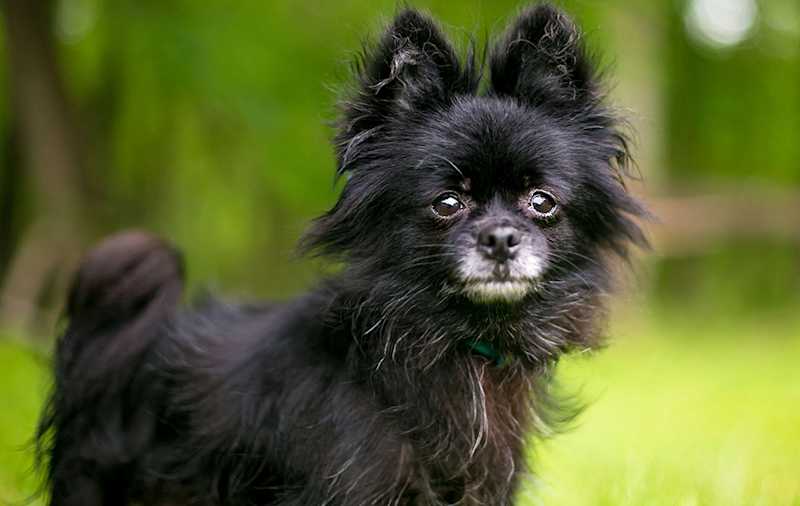
Find Chihuahua puppies near you
Adopting a Chihuahua
Learn about acquiring a Chihuahua - the pros and cons of adopting versus going through a breeder, and associated costs.

Molli
Chihuahua
Female, 9 yrs
Los Angeles, CA
Good with dogs
Not good with cats
Needs special attention
Needs experienced adopter
House-trained
Spayed or Neutered
Shots are up-to-date

Rosalie
Chihuahua
Female, 7 yrs
Los Angeles, CA
Good with dogs
Good with cats
House-trained
Spayed or Neutered
Shots are up-to-date

Drew
Chihuahua
Male, 3 mos
West Hollywood, CA
Good with dogs
Good with cats
House-trained
Shots are up-to-date

Molly
Chihuahua
Female, 15 yrs 4 mos
Los Angeles, CA
Good with dogs
Good with cats
Spayed or Neutered
Shots are up-to-date

Nala
Chihuahua
Female, 2 mos
West Hollywood, CA
Good with dogs
Good with cats
House-trained
Shots are up-to-date

Princess
Chihuahua
Female, 2 mos
West Hollywood, CA
Good with dogs
Good with cats
House-trained
Shots are up-to-date

Stu
Chihuahua
Male, 3 mos
West Hollywood, CA
Good with dogs
House-trained
Shots are up-to-date

Buddy
Chihuahua
Male, 2 mos
West Hollywood, CA
Good with dogs
Good with cats
House-trained
Shots are up-to-date

Molli
Chihuahua
Female, 9 yrs
Los Angeles, CA
Good with dogs
Not good with cats
Needs special attention
Needs experienced adopter
House-trained
Spayed or Neutered
Shots are up-to-date

Rosalie
Chihuahua
Female, 7 yrs
Los Angeles, CA
Good with dogs
Good with cats
House-trained
Spayed or Neutered
Shots are up-to-date

Drew
Chihuahua
Male, 3 mos
West Hollywood, CA
Good with dogs
Good with cats
House-trained
Shots are up-to-date

Molly
Chihuahua
Female, 15 yrs 4 mos
Los Angeles, CA
Good with dogs
Good with cats
Spayed or Neutered
Shots are up-to-date

Nala
Chihuahua
Female, 2 mos
West Hollywood, CA
Good with dogs
Good with cats
House-trained
Shots are up-to-date

Princess
Chihuahua
Female, 2 mos
West Hollywood, CA
Good with dogs
Good with cats
House-trained
Shots are up-to-date

